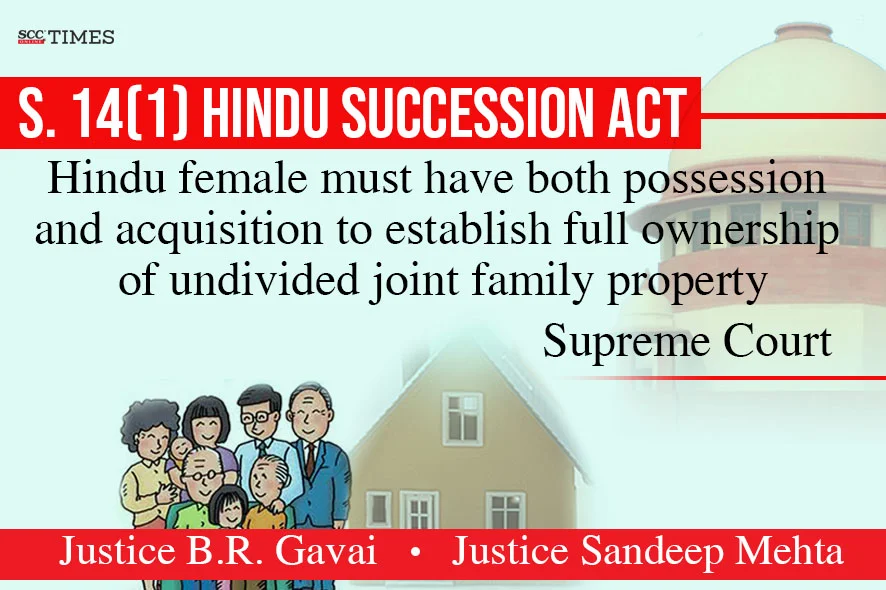Supreme Court: In a civil appeal against Rajasthan High Court’s Division Bench decision whereby, the appeal against decision of the Single Judge for upholding the Civil Court’s decision as to widow wife’s right to be maintained from the suit property of the Hindu family, was dismissed, the Division Bench of BR Gavai and Sandeep Mehta, JJ. allowed the appeal and set aside the impugned decisions.
The Bench reiterated that for establishing full ownership on the undivided joint family estate under Section 14(1) of the Succession Act, the Hindu female must not only be possessed of the property but she must have acquired the property.
Factual Matrix
The suit property was owned by A who had two sons, namely, M1 and M2. M2 was married to the original petitioner (widow-wife). The widow-wife, in the original suit claimed to adopt the plaintiff-son on 12-06-1959, nearly after 30 years of death of her husband. M1’s son had executed a will of the entire unpartitioned estate in favour of his son (the present appellant). M1’s son passed away in 1954 and the suit property devolved upon the present appellant under the will executed by his father/ M1’s son.
The widow-wife filed a civil suit seeking a declaration of title and possession over the suit property contending that the property in question was a joint Hindu family property and that the will allegedly executed by M1’s son was illegal. The present appellant was the defendant in the said civil suit and it was contended that he was not entitled to any share in the HUF property by virtue of the will. The Civil Court dismissed the said suit vide judgment and decree dated 21-05-1959, however recognised her rights of widow-wife only to the extent of receiving maintenance from the suit property. The said decision was challenged by the present appellant which was allowed by the Senior Civil Judge vide judgment dated 09-02-1968 and set aside the Civil Court’s judgment and decree.
A second appeal was preferred by the widow-wife before the Single Judge of the High Court, however, during the pendency of the same, when widow-wife passed away, her legal heir i.e. plaintiff-son was taken on record. The Single Judge allowed the second appeal and restored the Civil Court’s judgment to the extent of her right to be maintained from the suit property. Subsequently, the plaintiff-son filed Revenue Suit for partition of the suit property before the Revenue Court claiming his mother/ widow-wife was entitled to a rightful share in the property by virtue of Section
Analysis and Decision
The Court reiterated that the issue regarding title and possession over the suit property was concluded against widow-wife and that she was never in possession of the suit property was an admitted position from the record because she never challenged the judgment and decree dated 21-05-1959 whereby the suit filed by her for declaration of title and possession was dismissed by the Civil Court and she was held only entitled to receive maintenance from the undivided estate. The Court referred to Munni Devi v. Rajendra, 2022 SCC OnLine SC 643, wherein, the widow was actually residing in the suit property during the time the coparcener was alive and even after his death, she continued to reside in the said house and used to collect the rents from the tenants who were occupying the suit property till the date of filing of suit, hence, the Court after taking into consideration the pre-existing right of the female to maintenance from the estate of the HUF of her husband and her exclusive settled possession over the suit property concluded that she had acquired the suit property in lieu of her pre-existing right to maintenance and that she had held the suit property as the full owner and not limited owner by virtue of Section 14(1) of the Succession Act.
Regarding the question that whether in absence of even a semblance of possession either actual or legal over the suit property, plaintiff-son being the legal heir of widow-wife was entitled to institute a Revenue suit for partition of the suit property based on the succession rights of the widow on the joint Hindu family property, the Court referred to Ram Vishal v. Jagan Nath, (2004) 9 SCC 302, wherein, it was held that, a pre-existing right is a sine qua non for conferment of a full ownership under Section 14 of the Hindu Succession Act. The Hindu female must not only be possessed of the property but she must have acquired the property. Hence, the Court reiterated that, for establishing full ownership on the undivided joint family estate under Section 14(1) of the Succession Act, the Hindu female must not only be possessed of the property but she must have acquired the property and such acquisition must be either by way of inheritance or devise, or at a partition or “in lieu of maintenance or arrears of maintenance” or by gift or be her own skill or exertion, or by purchase or by prescription. Thus, the Court held that since, the widow-wife was never in possession of the suit property, as a necessary corollary the Revenue suit for partition claiming absolute ownership under Section 14(1) of the Succession Act could not be maintained by her plaintiff-son by virtue of inheritance.
Hence, the Court allowed the appeal and set aside the judgments of the Division Bench and the Single Judge.
[Mukatlal v. Kailash Chand, 2024 SCC OnLine SC 964, Decided on: 16-05-2024]




This is only law n on paper. Most females r made to sign gift deed or transfer papers to other members by which they lose ownership. SUPREME Court is also bios as it is run by ruling party. If truly wants to give share to females, they make law that d property belongs to them shd not b sold by any one n only in children of females hv d right to use n deal with d property on attaining g their majority.